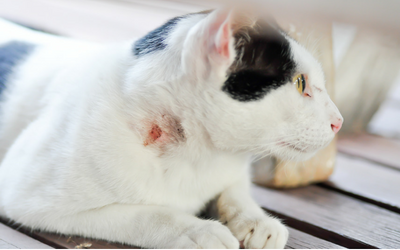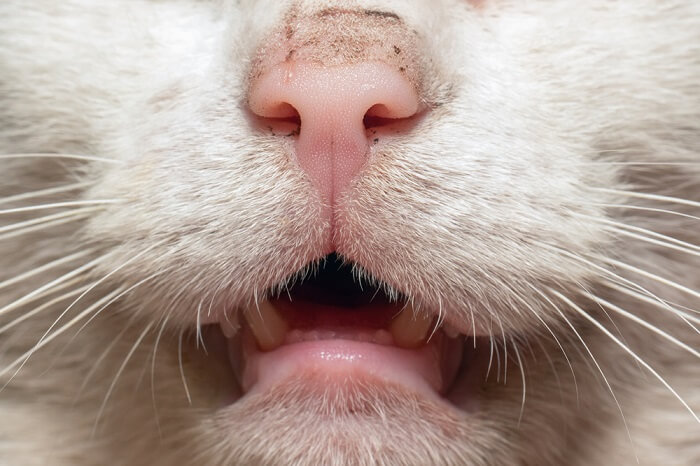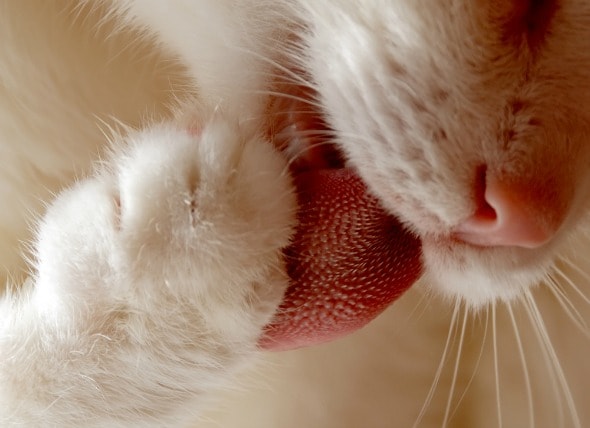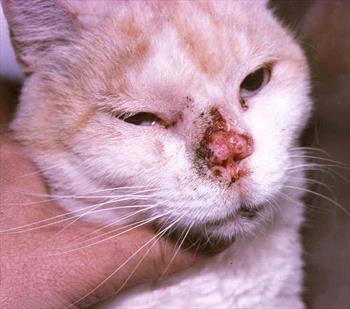sarcoma in cats jaw
Often the symptoms will depend on the area of the body the cancer is affecting. An oral tumor is an abnormal growth of cells.
Some tumors may grow slowly and do not typically spread called benign while others will act aggressively called malignant.

. Cats suffering from oral tumors often develop jaw cancer or cancer in the oral cavity. Osteosarcomas can also develop in the skull most commonly in the oral cavity pelvis ribs and vertebrae. The two most common types of oral cancers that occur in cats include squamous cell carcinomas and fibrosarcomas.
June 1 2018 by Mallory Pfeifer. These are the most common symptoms when a tumor affects. Bone cancer causes an abnormal swelling to develop in the affected part of the skeleton.
The provided history stated the cat had a lytic and proliferative lesion of the carpal bones. It is the most common oral cancer in cats. Causes Treatments Prevention and Tips.
If an osteosarcoma develops elsewhere in the skull or vertebrae swelling and pain in the. Cats with osteosarcoma of the jaw a form of axial osteosarcoma may have swelling of the jaw difficulty opening the mouth excessive salivation and may be reluctant to eat due to pain. The physical swelling of the cancer causes mechanical.
Swelling or a mass. A cats mouth similar to our own is made up of several different cell types. Tumors may develop anywhere on the body and appear as multiple small less than 04 inches 1 centimeter in diameter firm lumps under the skin surface.
After many visits it was discovered that the lump was actually some sort of tumor but the vet wouldnt know exactly which kind without a biopsy. Cats with osteosarcoma of the jaw a form of axial osteosarcoma may have swelling of the jaw difficulty opening the mouth excessive salivation and may be reluctant to eat due to pain. What Kinds of Cancer Do Cats Get.
Bone Cancer in Cats. Mouth cancer can be a tumor located anywhere within a cats oral cavity including the lips tongue cheeks roof of the mouth upper or lower jaw and back of the mouth. They present as a subcutaneous beneath the skin lump and are malignant tumors arising from transformed cells.
Jaw If the cancer is affecting the jaw you might notice they are having trouble opening their mouth and eating or lots of saliva in their mouth. Osteosarcoma is the most frequently observed in old animals. The symptoms of osteosarcoma in cats can be subtle and they may include.
Osteosarcoma osteogenic sarcoma is an aggressive and destructive type of primary cancer that develops in the bones. This tumors affects the appendicular skeleton. The cancer causes pain.
Squamous cell carcinoma a kind of skin cancer that most often. Tumors are locally invasive and can extend into the bones of the upper or lower jaw. Lymphoma Blood cancer most often affecting the intestines lymph nodes nasal cavity kidneys or liver.
Mouth cancer is not connected to any breed age or sex of cat but experts believe second-hand smoke could contribute to its occurrence. Soft tissue sarcoma an aggressive malignant tumor that develops in fibrous connective tissue anywhere on the body sometimes at the site of an injection. This is often the first sign of.
My cat Momo is 9 years old and has a tumor on his jaw. 1 It accounts for about 90 of oral tumors in felines. Osteosarcomas arise solely from bony tissues such as the jaw bones.
These tumors grow very rapidly and typically invade nearby bone and tissue. Oral squamous cell carcinoma is cancer of the lining of the oral cavity including the gingiva gums tongue palate and tonsils. Squamous cell carcinoma is the most common oral tumor seen in cats.
Sarcomas are a specific type of cancer. It also includes lips the hard and soft palate roof of the mouth upper and lower jaw cheeks tongue and the floor of the mouth. The primary malignant bone tumors are uncommon in cats.
Cancer arises from osteoblasts or osteoclasts which are cells that produce a matrix which builds or breaks down bone. Tumors are classified as either primary in which the cancer forms directly in the bone or secondary where it has spread from an adjacent site. Primary tumors are uncommon in cats but for those cats who have the tumors up to a third of them are benign.
Carcinomas can occur in any part of the body including the mouth. Bone Cancer in Cats. Other common causes of oral tumors in cats are fibrosarcomas osteosarcomas and odontogenic tumors.
Lameness that doesnt go away and swelling of the affected bone. The whole episode started right around Christmas when he was showing signs of bad pain. Swelling or a mass.
Jan 12 2015. Oral tumorsboth non-cancerous and cancerouscan form in any part of your cats mouth. All of which can become cancerous eg skin cells bone cells fibrous cells.
Fibrosarcomas arise from the connective tissues within the mouth often from the jaw bones. Of the several types of cancerous oral growths that a cat can be affected by a squamous cell carcinoma is the most common one. The symptoms of bone cancer in cats include physical swelling lameness an abnormal gait and general unwellness.
By Judith Akins DVM MS. A small piece of carpal bone from an eight-year-old domestic short haired cat DSH was submitted to the Texas AM Veterinary Medical Diagnostic Laboratory TVMDL for histopathology. The rate of metastasis at the time of diagnosis is low.
The development of tumors occurs spontaneously with no known or apparent cause. It is the most common type of bone cancer in cats and accounts for 70 of bone tumours. Although squamous cell carcinomas dont spread rapidly to other parts of the body oral tumors may be locally invasive and spread to the chest.
Symptoms How can you know if your cat has osteosarcoma. Vet formulated to support your pets complete body in the fight against cancer. Although there is no specific cause of mouth cancer in cats the following environmental and dietary factors may contribute to the growth of malignant tumors in the oral cavity.
Bone cancer causes a number of signs of unwellness for two main reasons. Ad Help your pet fight cancer with NHVs most popular Cancer Pack. Odontogenic tumors arise from the tissues making up the teeth.
An aggressive form of oral cancer in cats oral squamous cell carcinoma or SCC is an extremely invasive tumor that attacks the jaw bone.

Coping With Cat Cancer Symptoms And Advice Blue Cross

Mouth Cancer Gingiva Squamous Cell Carcinoma In Cats Petmd

Common Oral Tumors In Cats And Dogs Vet In Aurora The Animal Dental Clinic

Cancerous And Non Cancerous Growths In A Cat S Mouth Petmd

Common Causes And Treatment For Sneezing In Cats Firstvet

The Pet Oncologist Vet Oncologist Online Oral Cancer In Cats

Abscesses In Cats Vca Animal Hospitals

Mouth Cancer In Cats Causes Symptoms Treatment All About Cats

Cat Keeps Licking Mouth Sign Of Cancer Scary Symptoms
/GettyImages-11673268481-ff230807a7e04e2db8e38e148edb19a5.jpg)
How To Treat Fibrosarcomas In Cats

Learn About Oral Cancers In Cats Petcure Oncology

Oral Tumor Changes Cat S Eating Habits Boston Herald

Tongue Cancer Squamous Cell Carcinoma In Cats Petmd

Mouth Cancer Melanocytic In Cats Petmd

Adopt Tori Senior Declawed Cat Offered By Owner On Petfinder Kitten Adoption Cats Cat Adoption

Learn About Nasal Cancer In Cats Petcure Oncology

Nasal Squamous Cell Carcinoma In Cats Veterinary Partner Vin

Feral Cat With Large Tumor On Jaw Makes Herself At Home On Family S Porch Baby Cats Animal Rescue Animal Rescue Site

